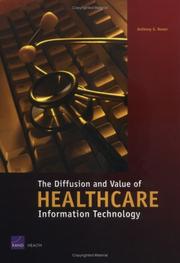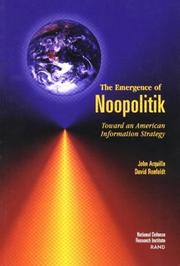| Listing 1 - 4 of 4 |
Sort by
|

ISBN: 0833037609 9786612283024 1282283022 0833040693 9780833040695 9780833040701 0833040707 9780833037602 9781282283022 1598753371 9780833037008 0833037005 9781598753370 Year: 2004 Publisher: Santa Monica, Calif. Rand
Abstract | Keywords | Export | Availability | Bookmark
 Loading...
Loading...Choose an application
- Reference Manager
- EndNote
- RefWorks (Direct export to RefWorks)
This report characterizes the diffusion of use of electronic health records (EHRs). The author uses interviews and surveys and a literature review to investigate whether healthcare is expected to duplicate the gains enabled by information technology seen in several prominent industries. To accomplish this, the following questions are asked: What is the current diffusion of health information technology? How does EHR diffusion compare to innovations in other industries? What is such diffusion worth to society? What should the government do, if anything, to speed the adoption of EHRs?
Teleconferencing. --- Medicine --- Medical records --- Diffusion of innovations. --- Information technology --- Evaluation. --- Government policy --- Data processing --- Cost effectiveness. --- Telematics. --- Telecommunication --- CMC systems --- Computer-mediated communication --- Cyberspace --- Innovations, Diffusion of --- Acculturation --- Communication --- Culture diffusion --- Technological innovations --- Clinical records --- Health records --- Hospital medical records --- Patient care records --- Communication in medicine --- Hospital records --- Clinical sciences --- Medical profession --- Human biology --- Life sciences --- Medical sciences --- Pathology --- Physicians --- Health Workforce

ISBN: 1282451111 9786612451119 0833048279 0585243484 0833026984 9780585243481 9780833048271 6612451114 9780833026989 Year: 1999 Publisher: Santa Monica, CA : Rand,
Abstract | Keywords | Export | Availability | Bookmark
 Loading...
Loading...Choose an application
- Reference Manager
- EndNote
- RefWorks (Direct export to RefWorks)
Strategy, at its best, knits together ends and means, no matter how various and disparate, into a cohesive pattern. In the case of a U.S. information strategy, this requires balancing the need to guard and secure access to many informational capabilities and resources, with the opportunity to achieve national aims by fostering as much openness as practicable. The authors' term to represent such strategic balancing is guarded openness. They go on to describe noopolitik (nu-oh-poh-li-teek)--an emerging form of statecraft that emphasizes the importance of sharing ideas and values globally, princi
Information policy -- United States. --- Information society. --- International relations. --- Telematics -- Social aspects. --- United States -- Foreign relations -- 1989-. --- International relations --- Information society --- Telematics --- Information policy --- Law, Politics & Government --- International Relations --- Social aspects --- Social aspects. --- United States --- Foreign relations --- CMC systems --- Computer-mediated communication --- Coexistence --- Foreign affairs --- Foreign policy --- Global governance --- Interdependence of nations --- International affairs --- Peaceful coexistence --- World order --- Telecommunication --- Cyberspace --- National security --- Sovereignty --- World politics --- Sociology --- Information superhighway

ISBN: 0415170788 041517077X 1134697317 9786610318735 1280318732 0203448634 9780203448632 9780415170772 9780415170789 9781280318733 6610318735 9781134697311 1134697309 Year: 2000 Publisher: London Routledge
Abstract | Keywords | Export | Availability | Bookmark
 Loading...
Loading...Choose an application
- Reference Manager
- EndNote
- RefWorks (Direct export to RefWorks)
This is the first complete introduction to and analysis of the politics of the internet. Key concepts included are: power and cyberspace; the virtual individual; society in cyberspace, and imagination and the internet.
Cyberspace --- Telematics --- Power (Social sciences) --- Internet --- Social aspects --- Power (Social sciences). --- Social aspects. --- -Telematics --- -Power (Social sciences) --- #SBIB:309H103 --- #VCV monografie 1999 --- Empowerment (Social sciences) --- Political power --- Exchange theory (Sociology) --- Political science --- Social sciences --- Sociology --- Consensus (Social sciences) --- CMC systems --- Computer-mediated communication --- Telecommunication --- Space and time --- Computers --- Mediatechnologie / ICT / digitale media: sociale en culturele aspecten --- Computer architecture. Operating systems --- Mass communications --- Cyberspace - Social aspects --- Telematics - Social aspects --- Internet - Social aspects
Book
Year: 2021 Publisher: Basel, Switzerland MDPI - Multidisciplinary Digital Publishing Institute
Abstract | Keywords | Export | Availability | Bookmark
 Loading...
Loading...Choose an application
- Reference Manager
- EndNote
- RefWorks (Direct export to RefWorks)
Social media has the potential to provide rapid insights into unfolding public health emergencies such as infectious disease outbreaks. They can also be drawn upon for rapid, survey-based insights into various health topics. Social media has also been utilised by medical professionals for the purposes of sharing scholarly works, international collaboration, and engaging in policy debates. One benefit of using social media platforms to gain insight into health is that they have the ability to capture unfiltered public opinion in large volumes, avoiding the potential biases introduced by surveys or interviews. Social media platforms can also be utilised to pilot surveys, for instance, though the use of Twitter polls. Social media data have also been drawn upon in medical emergencies and crisis situations as a public health surveillance tool. A number of software and online tools also exist, developed specifically to aide public health research utilising social media data. In recent years, ethical issues regarding the retrieval and analysis of data have also arisen.
social media --- disordered eating behaviours --- body image --- female --- university students --- telemedicine --- carbon dioxide --- air pollutants --- vehicle emissions --- primary care --- machine learning --- teleconsultation --- remote consultation --- classification --- public health --- short video --- social network --- TAM --- cost analysis --- health technology assessment --- provider-to-provider telemedicine --- telehealth --- economic analysis --- questionnaires and surveys --- validation studies --- health personnel --- electronic nicotine delivery systems --- smoking --- twitter --- poor doctor-patient relationship --- healthcare consultation --- mobile context --- computer-mediated communication --- point-of-care systems --- ultrasonography --- traffic-related pollution --- primary health care --- acceptability of health care --- surveys and questionnaires --- health communication --- Spanish official medical colleges --- stakeholders --- Twitter --- systemic lupus erythematosus (SLE) --- network analysis --- topic modeling --- text analysis --- online media --- vaccination --- social marketing --- stroke --- prehospital emergency care --- training --- stroke code --- large vessel occlusion --- prehospital scales --- hearing loss --- latent topic --- LDA --- social Q& --- A --- public voice --- public health emergency --- policy evolution --- product innovation --- cooperative governance --- COVID-19 --- coronavirus --- masks --- transmission
| Listing 1 - 4 of 4 |
Sort by
|

 Search
Search Feedback
Feedback About UniCat
About UniCat  Help
Help News
News